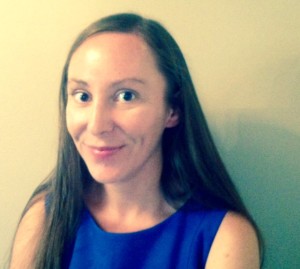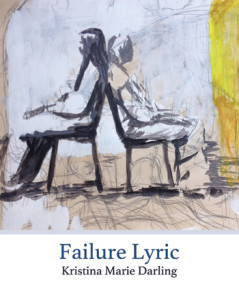 The Writers Who Read series continues this week with Kristina Marie Darling. Welcome, Kristina!
The Writers Who Read series continues this week with Kristina Marie Darling. Welcome, Kristina!
Who are you?
I’m a poet, fiction writer, and critic. My most recent books are Women and Ghosts and Failure Lyric, both available from BlazeVOX Books. I also serve as Associate Editor at Tupelo Quarterly, Founding Editor of Noctuary Press, and an editor at Handsome, the magazine publication of Black Ocean Books.
Which book or series was your gateway into the world of reading?
I loved C.S. Lewis when I was younger, but it wasn’t long before I became interested in nineteenth century Russian literature. Honestly, it’s like I went straight from sipping on a beer to guzzling scotch. Once I read War and Peace, there was no stopping me from reading Crime and Punishment, Dead Souls, all of Turgenev’s fiction, and all of Chekhov’s plays.
Nowadays, what makes you crack open a book instead of pressing play on your favorite Netflix show?
I’ve been traveling to various artist residencies for the past year, so usually, Netflix isn’t an option. Or if it is, there’s a tremendous amount of shame and guilt involved when you’re surrounded by smart, talented, creative people and you’re trying to find out who won on The Voice. And who would want Netflix anyway when these smart, talented artists are offering you book recommendations?
Which authors are auto-buys for you? Why?
If I could hit a button and pre-order everything by Joshua Clover, I would. I admire the ways that he uses the resources of poetry to make compelling interventions into contemporary literary theory. He suggests that poets can make necessary contribution to complex academic and philosophical conversations, ultimately democratizing the act of literary criticism.
What is your book kryptonite–those unique settings, tropes, or character types that make you unable to resist reading?
I just read Sarah Gehrard’s Binary Star (thank you to Diana Spechler for the recommendation!). For me, this book was everything a book should be. Not only did it make use of extended metaphor in a subtle, artful way (something that’s difficult for even the most experienced poets!) but the novel was filled with luminous, incandescent, and lyrical fragments, more beautiful than most of contemporary poetry. I love books like this, which blur the boundaries between poetry and fiction, plot and wild dream-like associations, and between reality and imagination.
What is your ideal time and place to read?
I know that this is going to sound crazy, but I actually don’t mind airports. I travel a lot, and when I’m in transit, I get to read as much as I want with no one to interrupt me. So yes, I’m that girl who almost missed her flight because she was lugging Infinite Jest and a bag of Twizzlers through the Baltimore Washington International Airport.
Are you a re-reader? Why or why not?
Absolutely! I love to read a collection of poems and then read it again immediately. This is because on the first read, I’m usually fixated on the individual pieces, their music, and their cadences. On the second read, it becomes clearer to me how the collection works on the level of a book-length sequence. In other words, the larger structure reveals itself in a way that it usually doesn’t on the first time through.
Which books have had the biggest influence on your writing? 
It was Jenny Boully’s The Body: An Essay that showed me it’s possible for poetic language to exist in forms that are not germane to poetry: footnotes, glossaries, endnotes, appendices, and so on. Kristy Bowen, Simone Muench, and Elizabeth Willis also showed me early on how multifarious and diverse the subgenre of prose poetry can be.
What makes a book a satisfying read for you?
As long as there’s some element of surprise, I’m usually happy. This unexpectedness can take many forms, though: a tension between form and content, an unexpected metaphor, beautiful language in a place where I wouldn’t necessarily expect to find it. I don’t like to be made comfortable within a text, but rather, I love to have my expectation of literature challenged and interrogated.
What are you reading right now?
I’m working on an essay about collaborations, which a terrific journal invited me to send. So right now, as I’m working on the essay, I’m reading Carol Guess and Kelly Magee’s With Animal, Elisa Gabbert and Kathleen Rooney’s new chapbook, and G.C. Waldrep and John Gallaher’s Your Father on the Train of Ghosts. I’m looking forward to checking out Jenny Offill’s Department of Speculation in the near future, too.
~
Kristina Marie Darling is the author of over twenty collections of poetry and hybrid prose. Her awards include two Yaddo residencies, a Hawthornden Castle Fellowship, and a Visiting Artist Fellowship from the American Academy in Rome, as well as grants from the Kittredge Fund, the Elizabeth George Foundation, the Ora Lerman Trust, and the Rockefeller Archive Center. She is currently working toward a Ph.D. in Literature at S.U.N.Y.-Buffalo and an M.F.A. in Poetry at New York University.

Watching the current miniseries is making me want to tackle War and Peace. 🙂 b